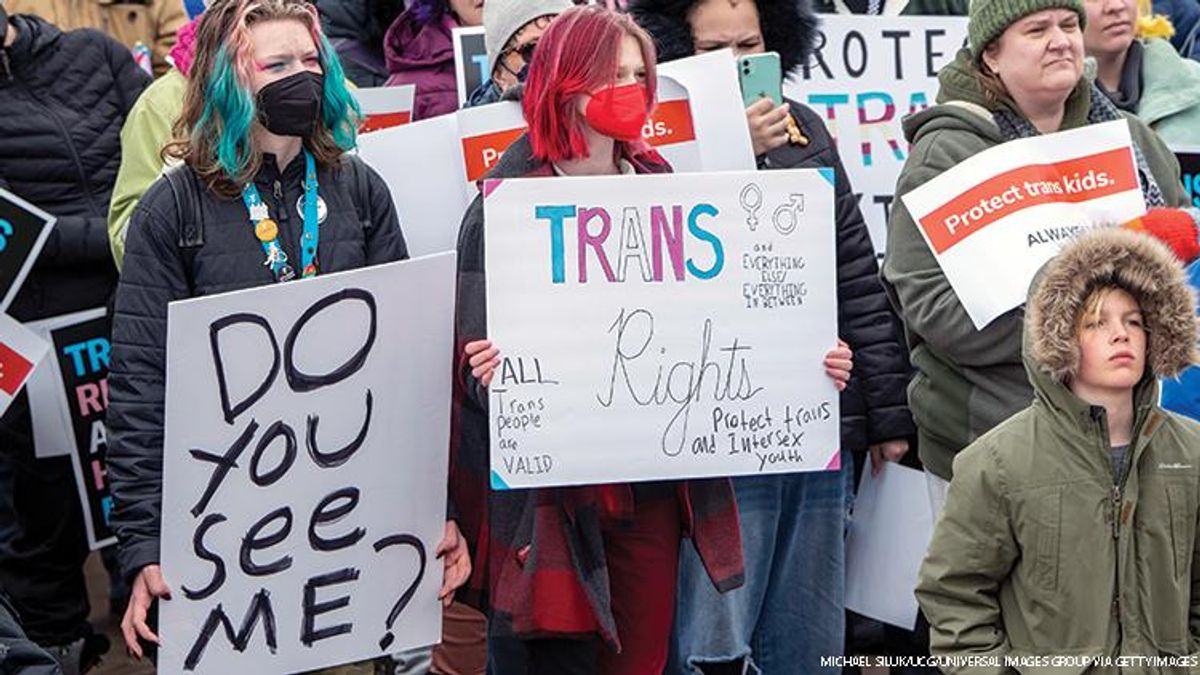At a time of unprecedented visibility for LGBTQ+ Americans -- and, arguably, unprecedented progress -- there are also unprecedented attacks.
Florida's "don't say gay or trans" law. The governor of Texas declaring that parents who support their transgender children are child abusers. More than 300 anti-LGBTQ+ bills introduced in states around the nation this year, surpassing 2021's record of 250-plus.
The Republican-backed bills would restrict the rights of LGBTQ+ people in a variety of ways. Some, like the infamous Florida measure, now signed into law by Gov. Ron DeSantis, would ban or at least limit classroom discussion of sexual orientation and gender identity. Others would keep books with LGBTQ+ content out of school libraries. Some would deny trans children access to medically necessary, often lifesaving, gender-affirming care, even threatening to jail doctors who provide it. And keeping trans student athletes from competing under their gender identity remains a rallying cry for right-wingers.
Most of these bills won't pass, but the ones that do will do real harm. And even when they don't pass, the rhetoric of the debates around them does harm too. Backers have characterized gender-affirming care as mutilation, have accused LGBTQ+ activists of "grooming" children for sexual abuse, and have claimed schools are turning kids gay or transgender. One lawmaker in Idaho said he'd rather have his 6-year-old grandson start smoking than be exposed to LGBTQ-inclusive books.

A walkout at Disney earlier this year over CEO Bob Chapek's handling of Florida's "don't say gay" bill.
The tidal wave of bad legislation has come when there's an LGBTQ-friendly administration in Washington; plenty of LGBTQ+ characters on TV and in movies, often played by out actors; and polls showing record support for equality, especially among young people. The bills and other anti-LGBTQ+ moves are partly in reaction to the progress the community has made.
"You can certainly see that there is a growing fear and backlash around what we're seeing in the culture," says Cathy Renna, communications director for the National LGBTQ Task Force. The increasing affirmation of LGBTQ+ people, she says, "is really terrifying to the people who want to maintain the status quo and live in the 1950s."
Backers of these bills "are people whose mission is to roll back acceptance of LGBTQ people," adds Cathryn Oakley, state legislative director and senior counsel at the Human Rights Campaign.
The legislation is also part of a concerted effort by right-wing groups such as the Alliance Defending Freedom, the Heritage Foundation, and the Family Research Council, and activists say it shows their increasing desperation in seeking to marginalize LGBTQ+ people. They've failed to stop marriage equality, failed in most "license to discriminate" efforts, failed in most anti-trans "bathroom bill" fights, so now they're attacking one of the most vulnerable segments of the community, trans kids, Oakley says.
Anti-LGBTQ+ activism usually goes hand in hand with fights against rights for other groups of people. Many bills seeking to limit schools' teaching around sexual orientation and gender identity take aim against discussion of racism as well, with their supporters claiming that's "divisive." Critical race theory, a complex concept that informs college-level studies but is not generally used in K-12 schools, has become a catch-all term for any antiracism lessons the far right doesn't approve of.
And even though trans-exclusionary sports bills are touted as "protection" of women's sports, their backers don't care about funding for women's sports or stopping abuse of female athletes, Oakley points out. "They will stop caring about women's sports the moment it's no longer politically convenient for them," she says. They don't care about women's rights in general either -- for instance, the day in March that Arizona Gov. Doug Ducey signed two anti-trans bills into law, he signed one banning most abortions after 15 weeks.
There are ways to fight back. One is in the courts. The National Center for Lesbian Rights and legendary lawyer Roberta Kaplan quickly filed suit against the Florida law, calling it "blatantly unconstitutional." The American Civil Liberties Union and Lambda Legal sued to stop the "child abuse" investigations of trans-supportive families ordered by Texas Gov. Greg Abbott and have won a temporary block on them. Other suits are challenging laws that limit trans kids' health care and access to sports teams.
Another is by mobilizing public opinion -- making clear who trans young people really are and what kind of care they receive, and that cisgender women athletes are doing just fine with the inclusion of trans competitors. "We have a lot of work to do to help people understand who our trans and nonbinary siblings are," Renna says. She suggests the work of the GenderCool Project, which has a website and other media campaigns telling the stories of trans youth, and of journalist Imara Jones, especially her podcast The Anti-Trans Hate Machine. Plus a new edition of the bookTrans Bodies, Trans Selveshas recently been published. Oakley notes that HRC and many other organizations have videos documenting the experiences of trans kids.
"The most important thing people can do is educate themselves and educate people around them about what it means to be a trans kid," Oakley adds. With the COVID-19 pandemic, foreign wars, and the investigation into the insurrection of January 6, 2021, "there are many things that are very rightly taking up our brain space," she says. But it's worthwhile to devote some of that brain space to trans youth, she says.
This story is part of The Advocate's 2022 Champions of Pride issue, which is out on newsstands May 17, 2022. To get your own copy directly, support queer media and subscribe -- or download yours for Amazon, Kindle, Nook, or Apple News.


















































































